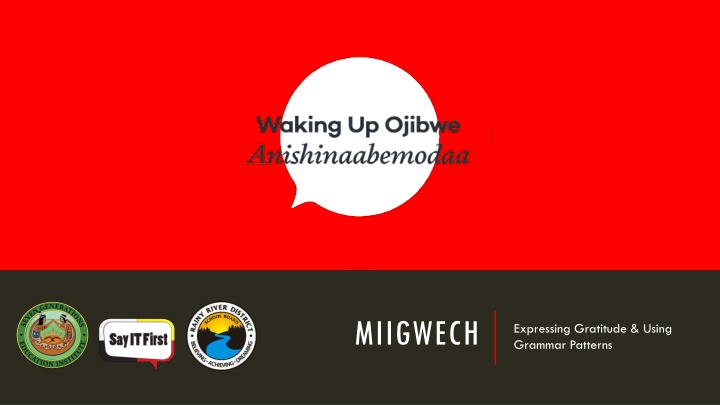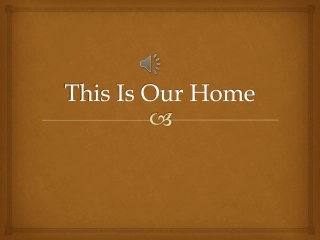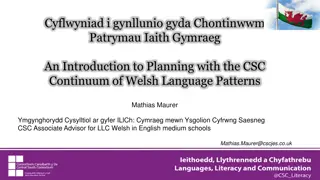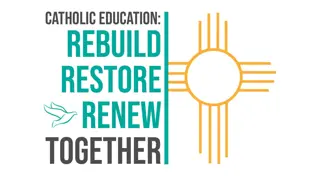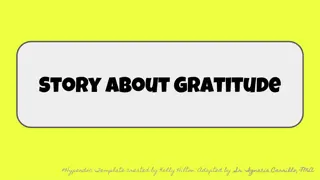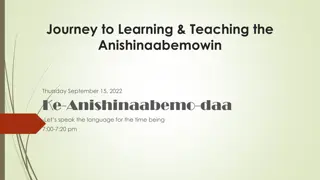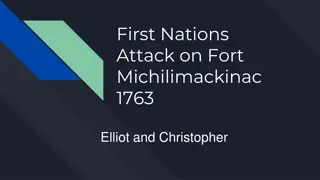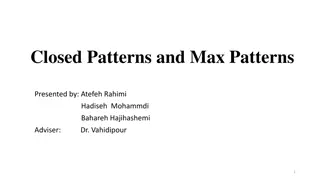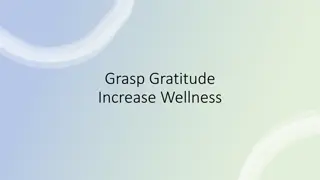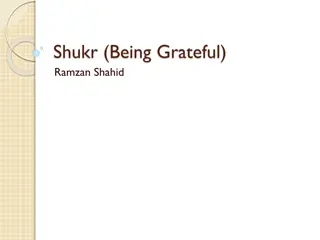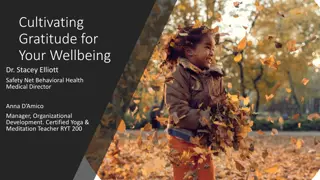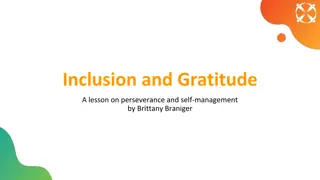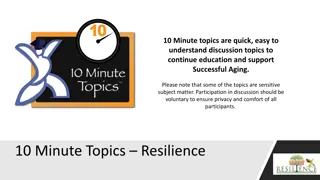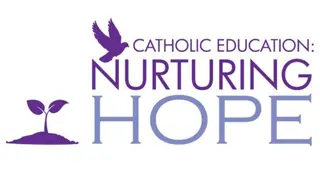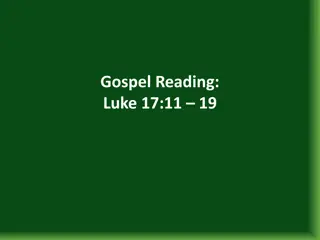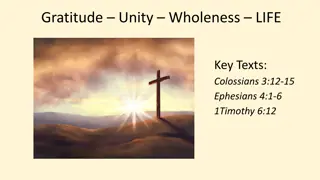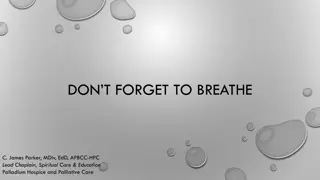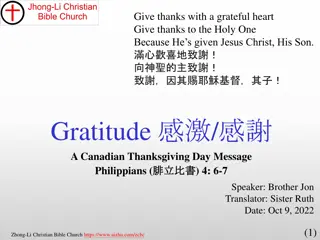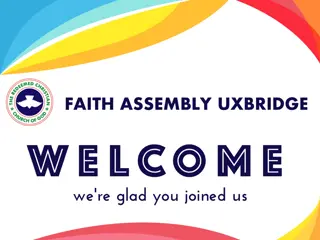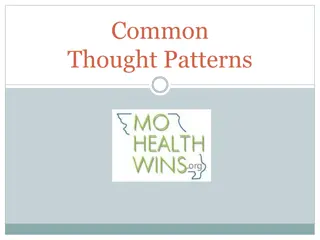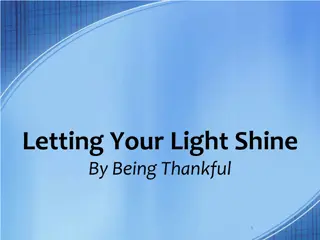Embracing Gratitude: An Exploration of Ojibwe Language Patterns
Discover the significance of expressing gratitude in Ojibwe culture through grammar patterns and verb forms. Learn about inanimate and animate verbs, conjugations, and use of the Ojibwe People's Dictionary. Dive into the language of thankfulness and the importance of simple gratefulness expressions.
Download Presentation

Please find below an Image/Link to download the presentation.
The content on the website is provided AS IS for your information and personal use only. It may not be sold, licensed, or shared on other websites without obtaining consent from the author.If you encounter any issues during the download, it is possible that the publisher has removed the file from their server.
You are allowed to download the files provided on this website for personal or commercial use, subject to the condition that they are used lawfully. All files are the property of their respective owners.
The content on the website is provided AS IS for your information and personal use only. It may not be sold, licensed, or shared on other websites without obtaining consent from the author.
E N D
Presentation Transcript
MIIGWECH Expressing Gratitude & Using Grammar Patterns
NOONGOM Waa-izhichigeying Waking Up Ojibwe Anishinaabemodaa Introductions Expressing Gratitude vii & vai vti & inanimate nouns vta & animate nouns Using the Patterns
WHY GRATITUDE IS IMPORTANT It is important for us to remember to express gratitude for everything. We can be thankful for waking up in the morning, for someone helping us, for food from the land, and so many other things. The language around expressing gratitude can be simple or complicated. Today we will focus on the grammar patterns that allow us to express simple gratefulness.
ANISHINAABEMOWIN VERB FORMS vii vai vti vta Verb Inanimate Intransitive Verb Animate Intransitive Verb Transitive Inanimate Verb Transitive Animate miskwadite miskwadiso miskwadisin miskwadis
USING THE OJIBWE PEOPLES DICTIONARY 1. Go to https://ojibwe.lib.umn.edu/ 2. Type in your word and select Search in Ojibwe or Search in English 3. Choose the needed verb based on the denotations in the gray circles
VERB INANIMATE INTRANSITIVE & VERB ANIMATE INTRANSITIVE vii & vai
vii These types of verbs describe a state of being. They can relate to an object or an abstract notion. Some examples are: gakakaa it is square gimiwan it is raining ozaawaa it is yellow zaagaate it shines, sun comes up or out dibikad it is night dakiigamin it is cold (liquid)
vai These types of verbs describe an action being done by someone. The main verb form is always in third person singular to start and has to be conjugated to change. Some examples are: miigwechiwendam s/he is thankful, grateful bimose s/he is walking namadabi s/he is sitting giiyose s/he is hunting
A Form conjugations of miigwechiwendam nimiigwechiwendam I am grateful gimiigwechiwendam you are grateful miigwechiwendam s/he is grateful nimiigwechiwendaamin we are grateful (not including the one spoken to) gimiigwechiwendaamin we are grateful (including the one spoken to) gimiigwechiwendaam you all are grateful miigwechiwendamoog they are grateful
A Form Yes/No Questions of miigwechiwendam nimiigwechiwendam ina? Am I grateful? gimiigwechiwendam ina? Are you grateful? miigwechiwendam ina? Is s/he grateful? nimiigwechiwendaamin ina? Are we grateful? (not including the one spoken to) gimiigwechiwendaamin ina? Are we grateful? (including the one spoken to) gimiigwechiwendaam ina? Are you all grateful? miigwechiwendamoog ina? Are they grateful? Asking a yes/no question: Use ina when the preceding word ends in a consonant and use na when the preceding word ends in a vowel. You can only put ina/na in the second position of a sentence it is always the second word.
A Form of miigwechiwendam with B Form vii Aaniin dash wenji-miigwechiwendaman? Why are you thankful? Let s express gratitude for different types of weather which are vii type verbs. Pattern: Nimiigwechiwendam ___________g/k. Nimiigwechiwendam gimiwang. Nimiigwechiwendam zoogipong. Nimiigwechiwendam awanibiisaamagak. Nimiigwechiwendam zaagaateg.
GOJITOON - TRY IT 1. Gimiigwechiwendam ina? Are you grateful? 2. Nimiigwechiwendam. I am grateful. 3. Aaniin dash wenji-miigwechiwendaman? Why are you grateful? 4. Nimiigwechiwendam gii-kimiwang noongom. I am grateful that it was raining today.
A Form of miigwechiwendam with B Form vai Aaniin dash wenji-miigwechiwendaman? Why are you thankful? Let s express gratitude for different activities that we did today. Pattern: Nimiigwechiwendam gii-___________yaan/aan. Nimiigwechiwendam gii-koshkoziyaan. Nimiigwechiwendam gii-wiisiniyaan. Nimiigwechiwendam gii-anishinaabemoyaan. Nimiigwechiwendam gii-jiikendamaan.
GOJITOON - TRY IT 1. Gimiigwechiwendam ina? Are you grateful? 2. Nimiigwechiwendam. I am grateful. 3. Aaniin dash wenji-miigwechiwendaman? Why are you grateful? 4. Nimiigwechiwendam gii-biijibizoyaan noongom. I am grateful that I drove here today. 5. Giin dash? Aaniin dash wenji-miigwechiwendaman noongom? And you? Why are you grateful today?
vti These types of verbs describe an action someone is doing to something inanimate. The main verb has to be conjugated in order to know who is doing the action. Some examples are: miigwechiwendan be thankful, be grateful for it mikan find it aabajitoon use it miijin eat it
A Form conjugations of miigwechiwendan nimiigwechiwendaan[an] I am grateful for it [them] gimiigwechiwendaan[an] you are grateful for it [them] omiigwechiwendaan[an] s/he is grateful for it [them] nimiigwechiwendaamin we are grateful for it/them (not including the one spoken to) gimiigwechiwendaamin we are grateful for it/them (including the one spoken to) gimiigwechiwendaanaawaa[n] you all are grateful for it [them] omiigwechiwendaanaawaa[n] they are grateful for it [them]
A Form Yes/No Questions of miigwechiwendan nimiigwechiwendaan[an] ina? Am I grateful for it [them]? gimiigwechiwendaan[an] ina? Are you grateful for it [them]? omiigwechiwendaan[an] ina? Is s/he grateful? nimiigwechiwendaamin ina? Are we grateful for it/them? (not including the one spoken to) gimiigwechiwendaamin ina? Are we grateful for it/them? (including the one spoken to) gimiigwechiwendaanaawaa[n] ina? Are you all grateful for it [them]? omiigwechiwendaanaawaa[n] ina? Are they grateful for it [them]? Asking a yes/no question: Use ina when the preceding word ends in a consonant and use na when the preceding word ends in a vowel. You can only put ina/na in the second position of a sentence it is always the second word.
ANISHINAABEMOWIN NOUNS Animate Nouns Inanimate Nouns Singular Plural Singular Plural ikwe ikwewag makak makakoon
USE THE OJIBWE PEOPLES DICTIONARY 1. Go to https://ojibwe.lib.umn.edu/ 2. Type in your word and select Search in Ojibwe or Search in English 3. Choose the needed noun based on the denotations in the gray circles Border Lakes dialect indicator This means it s more likely to be used in our area! sg - singular (one item) pl - plural (more than one item) dim - diminutive (small) loc - locative (location) Nancy Jones does a lot of recording for this dictionary and is great to listen to when her words are available!
MORE ABOUT NOUNS The animate/inanimate dichotomy was created by linguists to classify nouns in Anishinaabemowin. It does not mean something is alive/dead. This dichotomy is not necessarily always reflective of Anishinaabe worldview. Learning this dichotomy allows us to understand how the nouns function with verbs. Nouns can also be turned into diminutives, made smaller i.e. ikwe > ikwezens, makak > makakoons Nouns can also be turned into locatives, made locations i.e. makak > makakong
A Form conjugations of miigwechiwendan with Inanimate Nouns (ni) nimiigwechiwendaan nibi I am grateful for water gimiigwechiwendaanan ziinzibaakwadoonsan you are grateful for candies omiigwechiwendaan mino-bimaadiziwin s/he is grateful for the good life nimiigwechiwendaamin gaapii we are grateful for coffee gimiigwechiwendaamin miijim we are grateful for food gimiigwechiwendaanaawaan mazina iganan you all are grateful for books omiigwechiwendaanaawaan waabigwaniin they are grateful for flowers
A Form conjugations of miigwechiwendan with Inanimate Nouns (ni) Wegonen dash miigwechiwendaman? What are you grateful for? Let s express gratitude for different things we like. Remember they must be inanimate nouns (ni) Pattern: Nimiigwechiwendaan ___________. (singular) Nimiigwechiwendaanan ___________. (plural) Nimiigwechiwendaan nibi. Nimiigwechiwendaan miijim. Nimiigwechiwendaanan mazina iganan.
GOJITOON - TRY IT 1. Wegonen dash miigwechiwendaman? What are you grateful for? 2. Nimiigwechiwendaanan opiniin. Giin dash? I am grateful for potatoes. And you? Switch out the word opiniin for something you are grateful for be sure it is an inanimate noun (ni). Then ask someone else.
vta VERB TRANSITIVE ANIMATE
vta These types of verbs describe an action being done by someone to someone or something that is animate. The main verb form is always in second to third person command form and has to be conjugated to change. Some examples are: miigwechiwenim be thankful for h/ amo eat h/ bakite hit h/ zhawenim love h/
A Form conjugations of miigwechiwenim gimiigwechiwenimin I am grateful for you gimiigwechiwenimininim I am grateful for all of you nimiigwechiwenimaa I am grateful for h/ nimiigwechiwenimaag I am grateful for them omiigwechiwenimaan S/he is grateful for h/ (3rd person>4th person/thing) These are only a few of the many vta conjugations that we will focus on today.
A Form conjugations of miigwechiwenim with Animate Nouns (na) gimiigwechiwenimin niijii I am grateful for you my friend gimiigwechiwenimininim nindinawemaaganag I am grateful for all of you, my relatives nimiigwechiwenimaa inday I am grateful for my dog nimiigwechiwenimaag anangoog I am grateful for stars omiigwechiwenimaan bakwezhigan S/he is grateful for bannock
A Form conjugations of miigwechiwenim with Animate Nouns (na) Wegonen dash miigwechiwenimad? What are you grateful for? Let s express gratitude for different things we like. Remember they must be animate nouns (na) Pattern: Nimiigwechiwenimaa ___________. (singular) Nimiigwechiwenimaag ___________. (plural) Nimiigwechiwenimaa dibiki-giizis. Nimiigwechiwenimaag miskominag.
GOJITOON - TRY IT 1. Wegonen dash miigwechiwenimad? What are you grateful for? 2. Nimiigwechiwenimaag anangoog. Giin dash? I am grateful for stars. And you? Switch out the word anangoog for something you are grateful for be sure it is an animate noun (ni). Then ask someone else.
A Form conjugations of miigwechiwenim with Animate Nouns (na) Awenen miigwechiwenimad? Who are you grateful for? Let s express gratitude for different people in our lives. Pattern: Nimiigwechiwenimaa ___________. (singular) Nimiigwechiwenimaag ___________. (plural) Nimiigwechiwenimaa nimaamaa. Nimiigwechiwenimaag nookomisag.
GOJITOON - TRY IT 1. Awenen miigwechiwenimad? Who are you grateful for? 2. Nimiigwechiwenimaag nimishoomisag. Giin dash? I am grateful for my grandfathers. And you? Switch out the word nimishoomisag for someone you are grateful for. Then ask someone else.
USING THE PATTERNS How to substitute your verbs to create more sentences!
VII & VAI NEXT STEP The Pattern You Learned: Change the verb: Nimiigwechiwendam gimiwang. I am grateful that it s raining. Niminwendam gimiwang. I am happy when it s raining. Change the verb & the noun: Niminwendam zoogipong. I am happy when it s snowing. Change the person: Giminwendam zoogipong. You are happy when it s snowing.
VAI NEXT STEP Change the verb: The Pattern You Learned: Niminwendam gii-koshkoziyaan. I am happy that I woke up. Nimiigwechiwendam gii-koshkoziyaan. I am grateful that I woke up. Change the verb & the noun: Niminwendam gii-wiisiniyaan. I am happy that I ate. Change the person: Minwendamoog gii-wiisiniwaad. They are happy that they ate.
VTI NEXT STEP The Pattern You Learned: Change the verb: Nimiigwechiwendaan nibi. I am grateful for water. Niminwendaan nibi. I like water. Change the verb & the noun: Niwaabandaanan miinan. I see blueberries. Change the person: Owaabandaanan miinan. She sees blueberries.
VTA NEXT STEP The Pattern You Learned: Change the verb: Nimiigwechiwenimaa nimaamaa. I am thankful for h/ my mother. Ninzhawenimaa nimaamaa. I love h/ my mother. Change the verb & the noun: Niminwenimaa niwiijiiwaagan. I like h/ my partner. Change the person: Owaabamaan waawaashkeshi. She sees a deer.
GAGWEJIMISHIG! ASK US! If you have any questions about today s session or any upcoming sessions you can visit our website www.wakingupojibwe.ca www.anishinaabemodaa.ca Or contact Niigaanigaabawiik carissac@7generations.org The recording of this session will be shared on our website and YouTube page in the near future. Miigwech bizindawiyeg!
